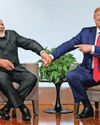The Pulwama terror attack and India’s reaction have certainly altered the political narrative.

Just a few hours after the Indian Air Force struck terrorist bases across the Line of Control on February 26, Prime Minister Narendra Modi was at his aggressive best as he addressed an election rally in Churu, Rajasthan. Amid loud cheers from the audience, Modi harked back to the pledge that he had taken in the run-up to the Lok Sabha elections in 2014, and declared, “Saugandh mujhe hai is mitti ki, main desh nahi mitne dunga (I swear by the soil of this country that I will not allow this nation to perish).” He insisted that the nation was in safe hands.
While Modi did not make any direct reference to the retaliatory action to the Pulwama terrorist attack, the message was clear—that he has lived up to the reputation of being a strong and decisive leader who has the gumption to take bold measures, and that he is the only leader who can deal effectively with the challenges to the country’s security.
This was underlined by BJP president Amit Shah at a party event in Ghazipur, Uttar Pradesh, when he said that India could prove its might through air strikes only because of Modi. The government, he said, had shown zero tolerance to terrorists.
The political appropriation of the air strikes by Modi and the BJP is in no doubt, and the party realises that the scenario emerging from the terror attack in Pulwama has tremendous potential to alter the electoral narrative ahead of the Lok Sabha polls. With less than two months to the elections, the ruling party is expected to project Modi as a leader capable of taking bold actions to deal with challenges to national security, and a corollary of this would be that the opposition lacks a leader or a party with as strong a commitment towards national security. The emerging scenario is also in sync with the BJP’s claims of being a party committed to nationalistic ethos.
Denne historien er fra March 10, 2019-utgaven av THE WEEK.
Start din 7-dagers gratis prøveperiode på Magzter GOLD for å få tilgang til tusenvis av utvalgte premiumhistorier og 9000+ magasiner og aviser.
Allerede abonnent ? Logg på
Denne historien er fra March 10, 2019-utgaven av THE WEEK.
Start din 7-dagers gratis prøveperiode på Magzter GOLD for å få tilgang til tusenvis av utvalgte premiumhistorier og 9000+ magasiner og aviser.
Allerede abonnent? Logg på

The female act
The 19th edition of the Qadir Ali Baig Theatre Festival was of the women and by the women

A SHOT OF ARCHER
An excerpt from the prologue of An Eye for an Eye

MASTER OF MAKE-BELIEVE
50 years. after his first book, Jeffrey*Archer refuses to put down his'felt-tip Pilot pen

Smart and sassy Passi
Pop culture works according to its own unpredictable, crazy logic. An unlikely, overnight celebrity has become the talk of India. Everyone, especially on social media, is discussing, dissing, hissing and mimicking just one person—Shalini Passi.

Energy transition and AI are reshaping shipping
PORTS AND ALLIED infrastructure development are at the heart of India's ambitions to become a maritime heavyweight.

MADE FOR EACH OTHER
Trump’s preferred transactional approach to foreign policy meshes well with Modi’s bent towards strategic autonomy

DOOM AND GLOOM
Democrats’ message came across as vague, preachy and hopelessly removed from reality. And voters believed Trump’s depiction of illegal immigrants as a source of their economic woes

WOES TO WOWS
The fundamental reason behind Trump’s success was his ability to convert average Americans’ feelings of grievance into votes for him

POWER HOUSE
Trump International Hotel was the only place outside the White House where Trump ever dined during his four years as president

DON 2.0
Trump returns to presidency stronger than before, but just as unpredictable